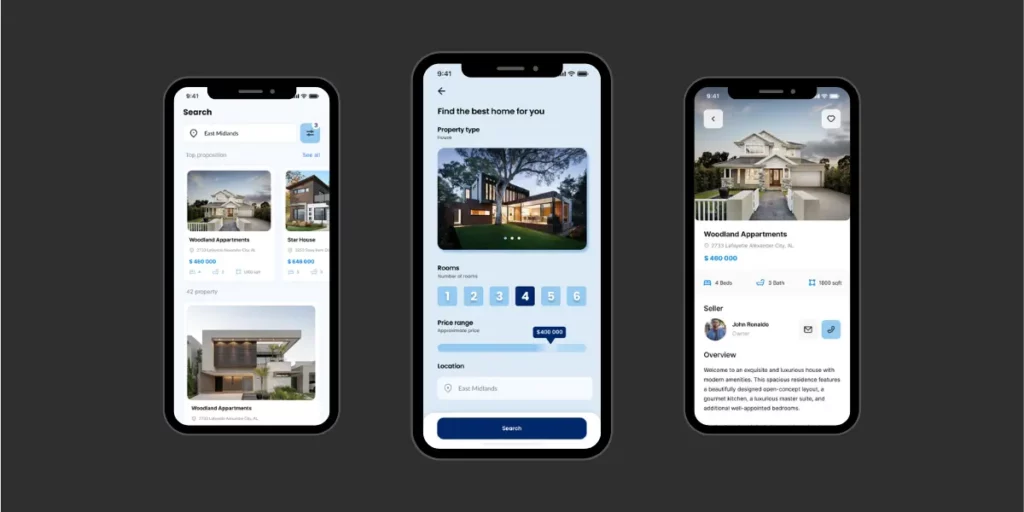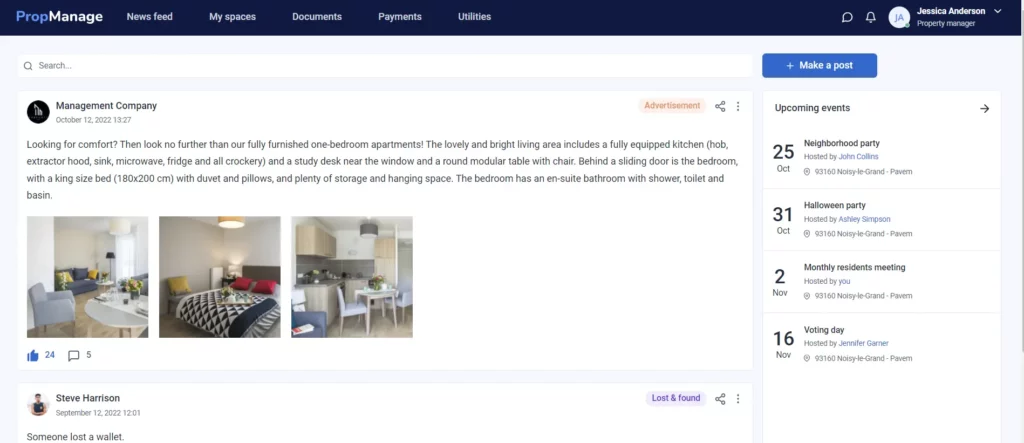The real estate industry in Germany isn’t just a significant driver of economic growth, but a reflection of the country’s broader environmental, social, and economic policies. It contributes to employment, investment attractiveness, and the overall quality of life for its citizens. As a result, its challenges affect other areas of life as well.
As we can see from the industry news in the Q3 of 2023, the German real estate market is facing several challenges now that the summer break is over:
- Housing affordability challenge
- Cause additional stress for tenants and lots of routine work for landlords
- Forces the government to push for cheaper homes without sacrificing quality
- Rising interest rates
- Create additional burden with financing
- Lead to insolvencies among property developers,
- New energy and sustainability regulations
- Cause increasing construction costs
- Change framework conditions in asset management
- Post-pandemic “work from anywhere”
- Changes the way people live and work
- Leads to changes in space requirements, locations, and property values
In this article, we’ll talk about the outlook on the German real estate market in terms of housing affordability as of September 2023, and see how PropTech solutions can help it.
Housing Affordability Crisis
Image: Christophe Gateau/dpa/picture alliance
Around Europe, the majority of the population usually owns their houses or apartments – up to 70%. According to DW, the numbers in Germany, however, are dramatically lower at 46% and that’s on average since major cities’ ratio is even lower.
The prices, however, are on the rise. According to ImmoScout, in the last five years, rent prices have almost doubled:
While the site offers other options at more affordable prices, the queue for those properties is long and the majority of people who want to find a new place to live as a growing family simply can’t find an option that would match their needs and budgets. With a usual income of around €2,380 per month (as of 2022 according to wearedevelopers.com), paying €3,500 or €4,000 for an apartment in “cold rent” (kaltmiete) is just not feasible.
What are acceptable prices? A rent level of €6.50 to €7.50 per square meter is socially acceptable, but there are simply no apartments for rent at that price tag.
Other German cities don’t offer too many options either:
- Munich: around €19
- Stuttgart: €18
- Cologne and Dusseldorf: a bit cheaper at €13
With so many people trying to move to a city from more rural areas, this is to be expected, but what can be done about those who are simply trying to survive and find a place to live and take care of themselves and their families?
Why housing affordability is important for society?
Affordable housing is not just about low prices. It affects society’s development as a whole: a good place to live means the ability to raise families well and focus on work or school without having to worry about being evicted or not being able to pay rent.
Here are some advantages of addressing housing affordability challenges or finding solutions:
- Meeting fundamental human needs.
- Ensuring economic stability and fostering growth opportunities.
- Supporting community growth and fairness.
- Enhancing educational outcomes.
- Lowering poverty rates.
- Promoting environmental sustainability.
Being able to live in a home addresses basic human needs and is recognized as a basic right in many countries. Affordable housing ensures that people have access to safe and stable shelter, which is essential for physical and mental well-being, and leads to a healthier society as a whole. Stable housing environments are less likely to expose occupants to environmental hazards, and having a secure home can reduce stress and improve overall well-being.
Economic Stability & Growth: The connection between housing affordability and economic stability is significant. When individuals can comfortably cover their housing costs, the likelihood of mortgage or rent payment defaults diminishes, contributing to greater financial stability within the housing sector and the broader economy. Additionally, affordable housing serves as a means to reduce societal support expenses, as individuals with access to affordable living arrangements can allocate their resources elsewhere, facilitating progress in various aspects of their lives. Moreover, it not only fosters stability but also enhances the potential for economic expansion. In cases where affordable housing is scarce, economic growth may be hampered, as it becomes challenging for businesses, particularly in high-cost regions, to both attract and retain employees.
Community Development & Social Equity: Affordable housing is crucial for making neighborhoods better. When homes are priced reasonably, more people with different backgrounds move in, and businesses come in too, making the area more lively and strong. It also helps everyone feel like they belong in their community and reduces the chances of people becoming homeless or moving too much. Affordable housing makes sure that everyone gets a fair chance at having a home and prevents unfair housing practices from hurting people.
Education: Children who grow up in stable and affordable housing are more likely to excel in school. A stable home environment allows children to focus on their education rather than worrying about frequent moves or housing instability. As a result, more psychologically stable, skilled, and qualified adults are entering the employment market.
Poverty Reduction: Affordable housing can help alleviate poverty by reducing the cost burden on low and moderate-income individuals and families. When people can find housing that doesn’t consume a large portion of their income, they have more resources for other essential needs like healthcare, education, and food.
Environmental Sustainability: Promoting housing affordability in urban areas can reduce urban sprawl and the need for long commutes, which, in turn, can have positive environmental effects by reducing greenhouse gas emissions.
7 reasons why housing affordability is important for real estate developers
The benefits for society are pretty much obvious, but let’s talk about why real estate developers should be interested in building affordable housing for people.
More Customers: When homes are affordable, more people can buy or rent them, which means more potential customers for developers.
Following the Rules: Sometimes, there are rules that say developers must include affordable homes in their projects. To get permission to build, they have to do this.
Getting Money & Steady Income: Developers often need loans or investments to build. Affordable housing projects can qualify for special funding or grants. Affordable housing can provide a steady income over time. Even though it may not make as much money upfront, it’s reliable in the long run.
Good Reputation & Doing the Right Thing: Developers want to have a good relationship with the communities they build in. If they don’t consider affordable housing, people might be unhappy, leading to protests and problems.
Reducing Risks: It’s a good idea for developers to have a mix of different types of housing. If they only build expensive homes, they could be in trouble if the market changes.
Helping the Market: By building affordable homes, developers can help stabilize the housing market, making it less likely to have big ups and downs.
Government Support: Sometimes, the government gives rewards to developers who create affordable housing. This can make these projects more appealing.
What can we & PropTech do about it?
While housing affordability is a huge complex challenge that involves numerous industries working together, what are the ways the PropTech industry can help to manage the affordability of real estate?
Proptech, short for property technology, refers to the use of technology to innovate and improve various aspects of the real estate industry. Proptech has the potential to address housing affordability challenges in several ways:
Cost Reduction in Development
Proptech can streamline the development process, making it more efficient and cost-effective. Technologies like Building Information Modeling (BIM) and construction management software can help reduce construction costs, which, in turn, can lead to more affordable housing units.
New technologies such as 3D modeling also help to minimize the costs since the construction can be done in shorter terms with fewer employees necessary.
Data Analytics for Market Insights
Proptech companies can use data analytics and artificial intelligence to provide insights into real estate markets. This information can help identify areas where affordable housing is most needed and guide developers and policymakers in making informed decisions about where to invest in new housing projects.
- GeoPhy is a Dutch-founded company with a presence in Germany, that utilizes data analytics and AI to assess property values and market trends. They offer data-driven insights for real estate investors, developers, and lenders to make informed decisions about their investments.
- Architrave, based in Germany, provides a data management platform for commercial real estate. Their platform incorporates AI and data analytics to digitize and optimize real estate portfolios, making it easier for investors and property managers to assess property performance and make strategic decisions.
Smart Financing Solutions
Proptech platforms can facilitate new financing models, such as crowdfunding and blockchain-based real estate investments, that can make it easier for individuals and small investors to participate in real estate development. This can increase the pool of funds available for affordable housing projects.
There are several startups on the German PropTech market that are focusing on financing solutions. For example:
- Exporo is a German crowdfunding platform that focuses on real estate investments. They allow individuals to invest in real estate projects with relatively low entry amounts, making them accessible to a broader range of investors.
- Rendity is another Austria & Germany-based real estate crowdfunding platform. They offer various investment opportunities in commercial and residential real estate and emphasize user-friendly, online investment processes.
Affordable Housing Marketplaces
Online platforms can connect potential renters or buyers with affordable housing options more easily. This can increase the visibility of available units and potentially create more competition among landlords, driving down rental prices.
ImmoScout24 is probably one of the most well-known real estate marketplaces where it’s possible to not only find a good apartment for rent but also benefit from the map of rent prices.
At HUSPI, we’ve got a mobile app prototype that focuses on real estate listings & communication. To learn more about OurDimDeals mobile app, check out our portfolio.

Tenant Screening and Rental Histories
Proptech can improve tenant screening processes, helping landlords make more informed decisions about potential tenants. This can reduce rental defaults and eviction costs, which can contribute to more stable and affordable housing markets.
For example, VermieterWelt is an example of a startup that deals with tenant screening and simplifies this boring routine background check. Its product features include such as:
- Access to Germany’s largest rent index database
- Access to the nationwide database for comparable rents
- Credit check independent of SCHUFA (a German credit reference agency)
- Automatic verification of all rental income
- Intuitive rent price calculator
- Digital creation of utility cost statements
- Automatic reminders and checklists
- and much more
Check out VermieterWelt’s website.
Energy Efficiency
Proptech, which is all about using the latest technologies for real estate, can help make homes use less energy. When homes use less energy, the bills for things like electricity and heating go down, which is good for the people who live there.
Proptech does this by adding smart gadgets and systems to homes that help control and save energy. So, it’s not just a short-term benefit; it means homes stay affordable to live in for a long time because you’re not spending too much on energy.
Affordable Housing Management & Property Management Efficiency
Proptech solutions offer valuable support to organizations and agencies, enabling them to effectively oversee affordable housing units, guaranteeing their proper upkeep and allocation to those in greatest need. Additionally, they enhance the efficiency of landlords and property managers, resulting in reduced operational expenses. These cost savings can potentially be translated into reduced rents for tenants.
As an illustration, software tools are available for property managers to streamline the management of bills, utilities, and maintenance information, simplifying these tasks for efficient operation.

Digital Mortgage and Homebuying Tools
Streamlined digital mortgage processes and online homebuying tools can make homeownership more accessible and affordable by reducing administrative costs and simplifying the home-buying process.
One such example is a German startup called JustHome which is focused on making the process of buying real estate more transparent and less complicated with numerous financing options.
Conclusion
While proptech has the potential to address housing affordability challenges, it’s important to note that it is not a panacea. There are challenges and potential downsides, such as data privacy concerns, increased competition in certain markets, and the risk of displacing traditional housing providers.
Policymakers, industry stakeholders, and proptech innovators need to work together to ensure that these technologies are harnessed effectively to achieve the goal of housing affordability without exacerbating other housing-related issues.
At the same time, it’s important not to overlook the technologies simply because they are new. We’ve got to use all that we can to make this world a better place to live.
Wondering about time-to-value?
Request a no-obligation discovery call and receive a preliminary estimate tailored to your KPIs.


